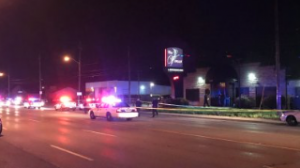
William Walker, Charles Reeves, Killed in Indianapolis Gentleman’s Nightclub Shooting. (Fox59.com)
Did negligent security contribute to this Indianapolis gentleman’s club shooting and are justice and compensation available to the victims families?
LOCAL NEWS
A shooting at an Indianapolis, Indiana gentleman’s club left two men dead, early Saturday morning, May 11, 2019. According to Fox59.com, “Indianapolis Metro Police Department confirmed two people were shot at Club Venus, a nightclub located near the intersection of N. Tibbs Avenue and W. 16th. Street…[t]he shooting happened just after 1 a.m.” Both victims were pronounced dead at the scene and have been identified as “William Walker, age 23, and Charles Reeves II, age 42,” According to the news report. A motive and suspects have not been identified, and the incident remains under investigation. Over the past few years, multiple shootings have occurred at Club Venus. WRAL.com reported on a shooting at Club Venus from April 2018, WISHtv.com reported on a shooting from June 2017 and Fox59.com reported on a shooting from August 2017.
OUR LEGAL TAKE
Nightclub patrons have a right to feel safe and secure while on the premises. The Murray Law Firm questions the level of security provided at the nightclub and whether this assault may have been prevented.
- Did the establishment make any security changes after any prior incidents of violence on the property?
- What security measures, such as visible surveillance cameras, and security personnel, were in place to deter crime and protect the victims at the time of the incident?
- Does the establishment have any protocol to check for deadly weapons prior to patrons entering the facility?
Generally, property owners are required to protect all those legally on the premises from any foreseeable harm. Should the facts of this matter reveal that the nightclub owner failed to provide adequate security to protect those on its premises, the families of William Walker and Charles Reeves II may seek justice and elect to pursue legal claims for their loss.
Based upon its prior successful experience in handling security negligence claims on behalf of victims and their families, The Murray Law Firm suggests that photographs and a thorough, unbiased inspection of the property will need to be performed immediately, before any evidence may be repaired, damaged or destroyed. Given the complexities of pursuing a negligent security case, it is imperative that the families of William Walker and Charles Reeves II retain an experienced attorney who can ensure the preservation of any and all evidence that may support such a claim.
OUR RESULTS
The Murray Law Firm has an extensive and successful record representing victims of violence and security negligence and their families. We have obtained over $100 Million in verdicts and settlements for out Clients, including a $29.25 million dollar verdict for a victim of an unsafe property. We offer our legal assistance, if desired.
We represent our Clients on a contingency agreement, which generally means that no fees or payments are owed until and unless we recover. Anyone seeking further information or legal representation is encouraged to contact us via e-mail (click here) or by telephone at 888.842.1616. Consultations are free and confidential.
Choosing the Right Attorney (Click Here)
 The Legal Chronicle
The Legal Chronicle


